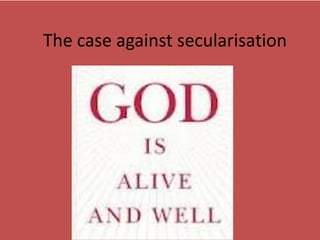
SociologyExchange.co.uk Shared Resource
- 1. The case against secularisation
- 2. Different evidence • Resacrilisation (linked to sects/NAMs etc) • Individuation • Rise of fundamentalism • Cultural defence
- 3. Resacrilisation Traditional religions maybe declining but other religions are growing. Resacrilisation is a ‘renewal or continuing vitality of religious beliefs’ (Greeley, 1972).
- 4. Resacrilisation Heelas - People are shifting from traditional religion to a more individualistic spirituality centred on the self. - (see NAMs – self improvement) - People are blending ‘hybrids’ (postmodernity) of religions to suit their own needs.
- 5. Brierley (2005) • Sects have been rising from 2.4% in 2000 to 3.1% in 2010 • Statistically that’s a healthy jump!
- 6. Evaluation Glendinning & Bruce Question Heelas’s data. Only 1 in 50 people in the Kendal area were engaged with NAMs in a typical week. Only half of that figure saw these activities as spiritual.
- 7. Wilson • Sees sects etc as ‘irrelevant’ • Members are in their own little enclosed worlds • Mainly appeal to drop outs or damaged people. • These religions have very little impact on their everyday lives as religions proper would do, ie) moral guidance Berger • Sects are ‘islands in a secular sea’
- 8. 2. Individuation Davie • Believing without belonging • Privatised worship • The rise of ‘vicarious religion’ – people experience second hand religion at baptisms etc
- 9. Evaluation Voas & Crockett • Use social trends data to show that since 1983 there has been a decline in attending and believing. Bruce • If people are not investing effort in attending then this represents a lack of commitment and a decline in strength of belief.
- 10. 3. Growth of Fundamentalism Many parts of the world have seen a revival of fundamentalist ideas. They are committed to religious laws. Almond Rise of Fundamentalism amongst: • Jews in Israel. • Muslims in Pakistan/Palestine/Egypt/former Soviet Union • Sikhs and Hindus in India • Christians in USA • Buddhists in Sri Lanka
- 11. Roof & McKinney • New Right (USA) – conservative Protestants • High church attendance/strong morality
- 12. Evaluation Bruce • Sees New Christian Right have only slowed down secularisation in USA. • These groups only appear significant because they are ‘unusual’ – they stand out in a secular world.
- 13. 4. Cultural Defence & Transition Bruce • Identifies 2 trends that go against secularisation – these are linked to high levels of religiosity. • Cultural defence (religion is a focal point for the defence of identities against threats) eg) Catholicism in Poland/Islam in Iran 1979. • Cultural transition (religion provides support and sense of community) eg) immigration to new country (this can be linked to Herberg – Protestant, Catholic, Jew)
- 14. Evaluation Bruce • Religion only survives in these situations because it as a focal point for IDENTITY..not spirituality. • Religion will survive where it performs this function..not because of a belief in faith (hence it does not really prove secularisation isn’t happening).
- 15. task Assess the arguments for and against the claim that contemporary societies are becoming more secular (33 marks) • Use the material in this ppt to plan the case AGAINST secularisation. • How would you use it?